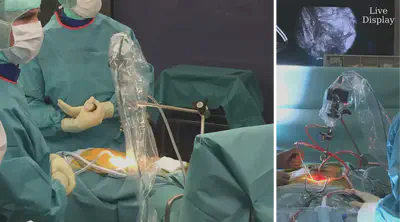PhD opportunity on "Intraoperative hyperspectral imaging for neurosurgery: Surgical workflow optimisation and validation"
This project will evaluate and contribute to the optimisation of a pre-CE-mark and pre-commercial HSI medical device for intraoperative surgical guidance in brain tumour surgery.

To deliver on this primary objective, the project will pursue the following aims:
- (A1) Investigate and optimise surgical integration of the intraoperative HSI (iHSI) device into the clinical workflow
- (A2) Investigate correlation between in-vivo HSI and ex-vivo histological analysis of corresponding biopsied pathological tissue
- (A3) Investigate correlation between in-vivo HSI and the Magnetic Resonance Imaging (MRI) appearance of imaged tissue
- (A4) Investigate the accuracy of the iHSI device to differentiate tumour, normal tissue, nerves and blood vessels from in-vivo iHSI data
- (A5) Disseminate the study’s outcomes and the device’s potential to patients and the public
- (A6) Knowledge exchange with the project’s external partner (Hypervision Surgical Ltd)
Patients undergoing brain tumour surgery have significantly improved outcomes and increased life expectancy if complete tumour removal is achieved. Successful surgery mandates maximal safe tumour removal but even with the most advanced current techniques, it is not possible to always reliably identify tumour and critical structures during surgery.
Hyperspectral imaging (HSI) is an advanced optical imaging technique that provides a promising solution for real-time computer-assisted tissue recognition during surgery by the safe application of light alone. HSI exploits the ability to split light into multiple narrow colour bands and can provide crucial but currently invisible information about critical biological structures during surgery.
This project will evaluate and translate a novel compact intraoperative HSI device in patients undergoing brain tumour surgery. The student will optimise the device for surgical use and will perform a clinical patient study assessing its integration into the neurosurgical workflow and quantitative image analysis.
1st Supervisor: Jonathan Shapey, King’s College London
2nd Supervisor: Tom Vercauteren, King’s College London
More information about the PhD project here.